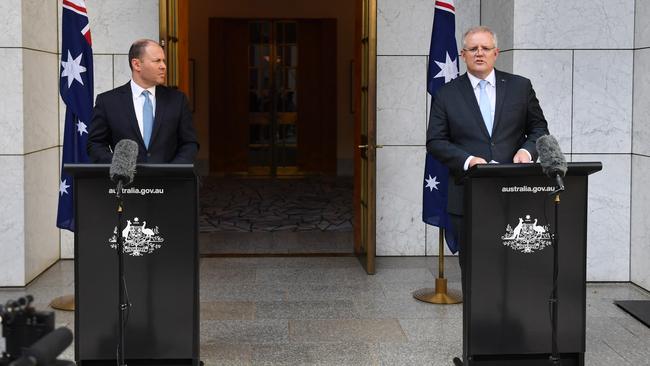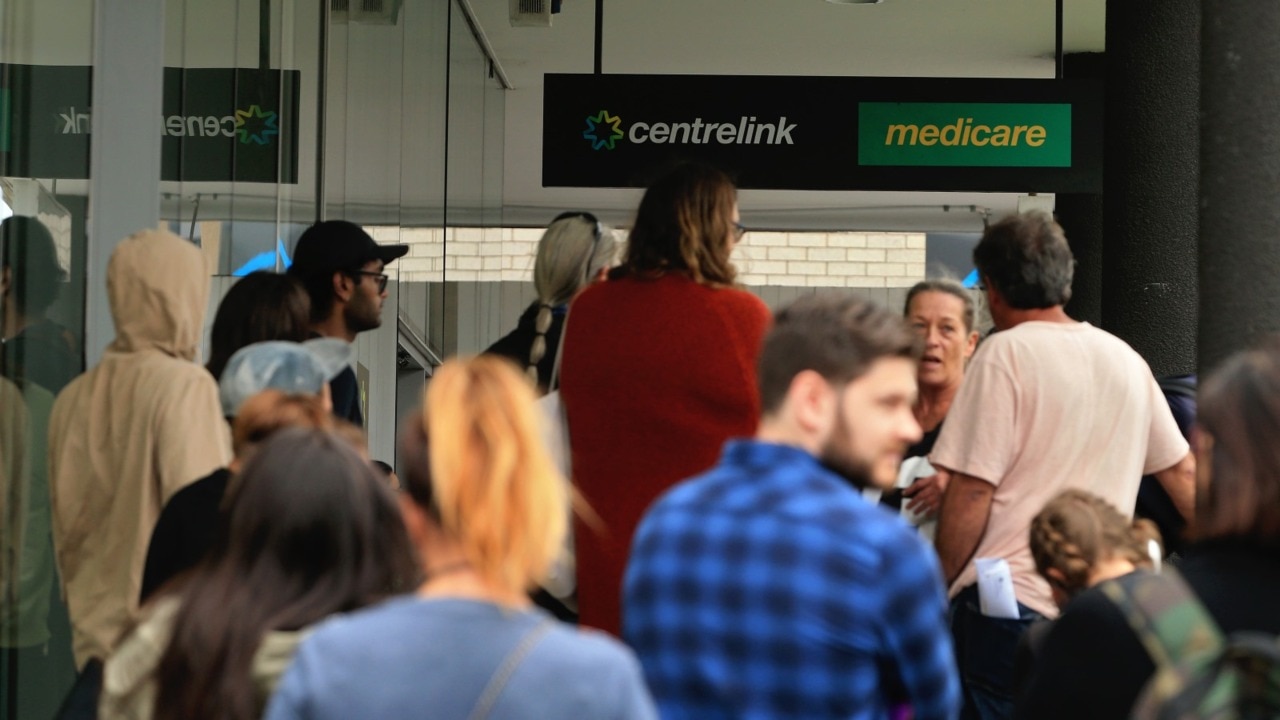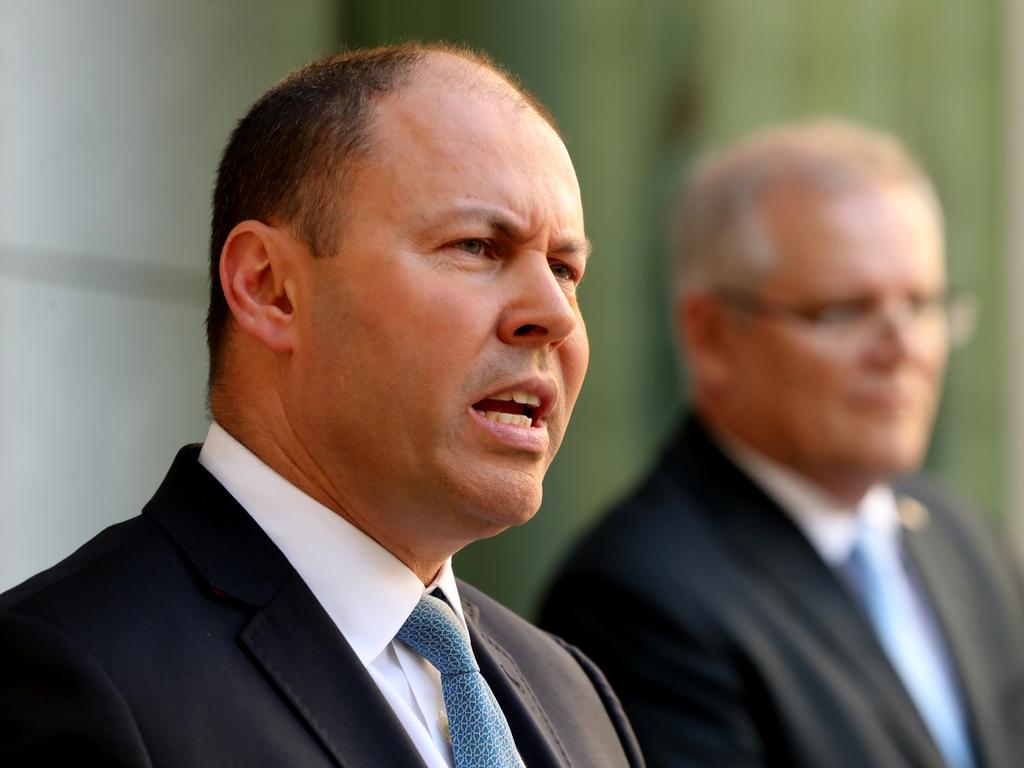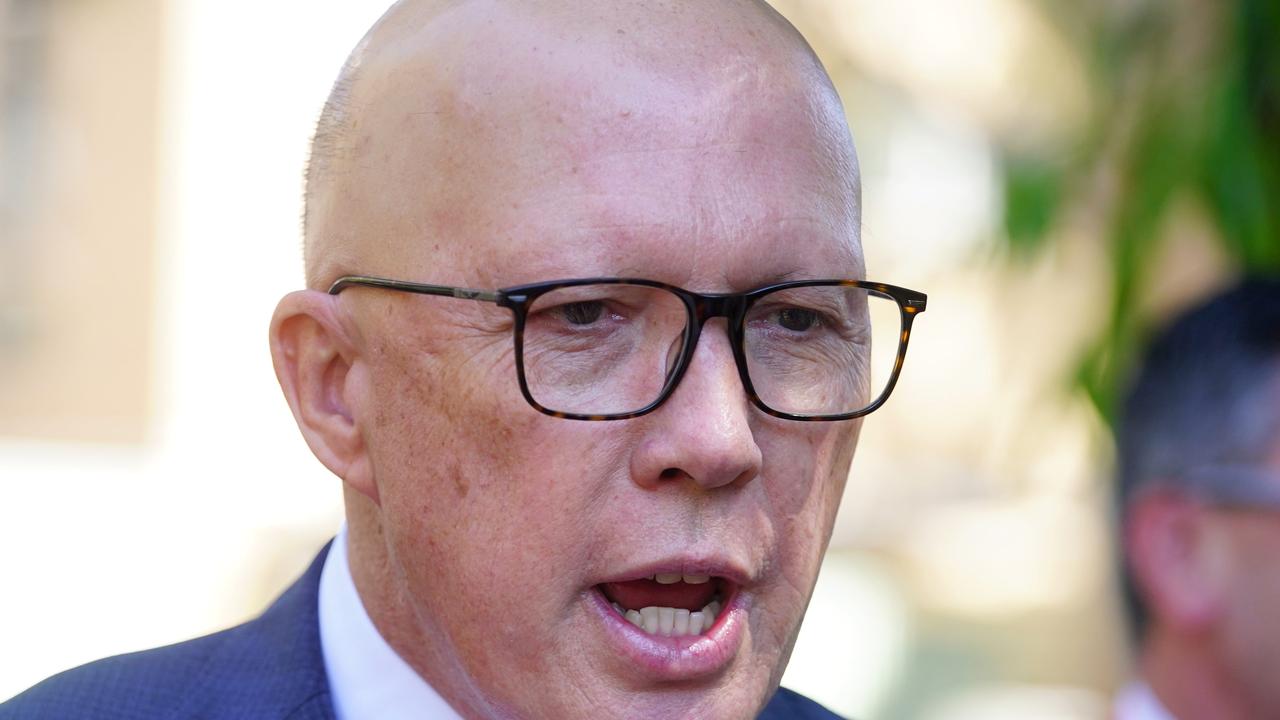Coronavirus: Scott Morrison announces $130bn scheme to protect jobs
Up to six million workers will receive $1500 fortnightly payments in Australia’s biggest ever rescue package amid COVID-19 crisis.

Up to six million workers will receive $1500 fortnightly payments under a $130bn JobKeeper scheme — the centrepiece of Australia’s biggest ever rescue package — to keep businesses open throughout the COVID-19 economic crisis and protect hundreds of thousands of jobs.
Scott Morrison said the unprecedented wage-subsidy payments were designed to “keep the engine of our economy running” as the country faced twin battles against coronavirus and the threat of “economic ruin”.
The government’s third COVID-19 rescue package will provide wage support to employees for six months from the first week of May, backdated to March 1, and takes the total economic support provided by the commonwealth — in fiscal and monetary terms — to $320bn, or 16.4 per cent of GDP.
Unions, business and industry groups welcomed the new stimulus package, which captures full- and part-time workers, sole traders and casual employees.
Australian shares surged on the government’s “whatever it takes” strategy, with the S&P/ASX 200 rising 7 per cent, its biggest one-day gain on record.
$130bn jobs lifeline: key points
The Prime Minister, who will announce extra cashflow support for businesses later this week, said governments were being forced to make “decisions like they never have before”.
“Now is the time to dig deep,” Mr Morrison said. “This calls for unprecedented action. We are working now to a whole new set of rules. But it’s our principles and values as Australians that will guide us through this uncharted territory and get us to the other side together.
“Our actions must be well considered, they must be well tempered and targeted. They must be effective. They must be clear in their purpose and they must be efficient in their execution.
“It is never the time for rash and ill-conceived decisions. That is why we have applied ourselves to delivering this plan that will provide Australians with the economic lifeline that they will need in the many months ahead to make it through.”

Within an hour of the JobKeeper program being announced, almost 8000 businesses had registered with the Australian Taxation Office.
The payment, which is in addition to the expanded JobSeeker program for workers who have lost their jobs, represents 100 per cent of the median wage in sectors hit hard by the COVID-19 economic shock, including hospitality, retail and tourism.
Under the wage subsidy package, eligible employers will include those with an annual turnover of less than $1bn who self-report a reduction in revenue of at least 30 per cent since March 1 over a minimum one-month period.
Larger businesses, excluding the big banks, with turnover of more than $1bn will need to demonstrate a revenue reduction of at least 50 per cent to be eligible.
Full-time and part-time employees, including stood-down workers, and casuals who have worked for an employer for at least 12 months, are eligible for the payment. New Zealand citizens in Australia who hold a subclass 444 special category visa can also access wage support.
Eligible employers include businesses structured through companies, partnerships, trusts and sole traders, as well as not-for-profit entities and charities.
In the past fortnight, retail, aviation, casino and hospitality companies including Qantas, Virgin, Myer, Flight Centre, Star Entertainment Group and Premier Investments have stood down or made redundant tens of thousands of workers in response to the strict COVID-19 travel and social restrictions.
Solomon Lew, who runs Premier Investments, said the 9000 staff his company stood down last week would now be able to access the new JobKeeper subsidy.
“The ability to retain team members during this challenging time will give businesses the best possible opportunity to bounce back and thrive,” Mr Lew said.
Harvey Norman co-founder Gerry Harvey said the wage subsidy would help with his aim of retaining every one of the retailer’s 14,000 Australian employees during the crisis.
Mr Morrison said the government’s scheme — more generous than New Zealand’s wage subsidy program and broader than the British model — must “go as far as possible”.
“Many countries in the months ahead and perhaps beyond … may well see their economies collapse,” the Prime Minister said.
“Some may see them hollow out. In the very worst of circumstances, we could see countries themselves fall into chaos. This will not be Australia.”
Josh Frydenberg said the wage subsidies would provide support to the Australian worker “like never before”, bolstering the government’s first two economic stimulus packages worth about $85bn.
The Treasurer said the government had partnered with the banks to support lending to their customers and were ensuring that tenants facing significant hardships as a result of coronavirus would have the security of a six-month moratorium on evictions.
“The past weeks have been tough but the weeks ahead will be tougher,” Mr Frydenberg said.
“Australians know that no matter how great the challenge is, their government has their back.”
Mr Frydenberg said employers had a legal obligation to ensure wage subsidies were passed on to employees.
Stood-down workers would also continue to accrue leave entitlements, including annual sick and long-service leave, as the stand-down period was counted towards their service.
Opposition Treasury spokesman Jim Chalmers said Labor believed the package was “a step in the right direction” and was “certainly more generous” for low-income earners. “We are going to have some briefings with the government so that we can understand all the details and all of the ins and outs because it is a massive amount of money being invested,” Dr Chalmers said.
At the national cabinet meeting on Monday night, state and territory leaders endorsed the wage announcement as they moved towards implementing rent relief for businesses and individuals.
Eligible businesses can start paying workers immediately and the tax office will start reimbursing them from early May.
The $750 weekly payment equates to 70 per cent of the national median wage, or a full median replacement wage for low-paid workers in accommodation, hospitality and retail sectors.
The payment will be paid to employers for up to six months, for each eligible employee who was on their books on March 1 and was retained or continued to be engaged by that employer.
The government has also temporarily relaxed the partner income test to ensure a person can receive the JobSeeker Payment, and associated coronavirus supplement, provided their partner earns less than $3068 a fortnight, or about $79,762 a year.
ACTU secretary Sally McManus said while unions were concerned a $1500-a-fortnight subsidy “may not be enough”, unions were glad the scheme applied to all businesses and most workers.“We also want to ensure all casuals who could have reasonably expected to work now but have lost their jobs because of the pandemic are covered,” she said.
“Many of these workers may not have worked the last 12 months. We also want to ensure that this subsidy applies to the 1.7 million visa workers who were working — there is no reason why it should not.”
Australian Chamber of Commerce and Industry chief executive James Pearson said the “unprecedented” payment was a game-changer that would save jobs and maintain crucial employer-employee relationships in the recovery phase to come.




